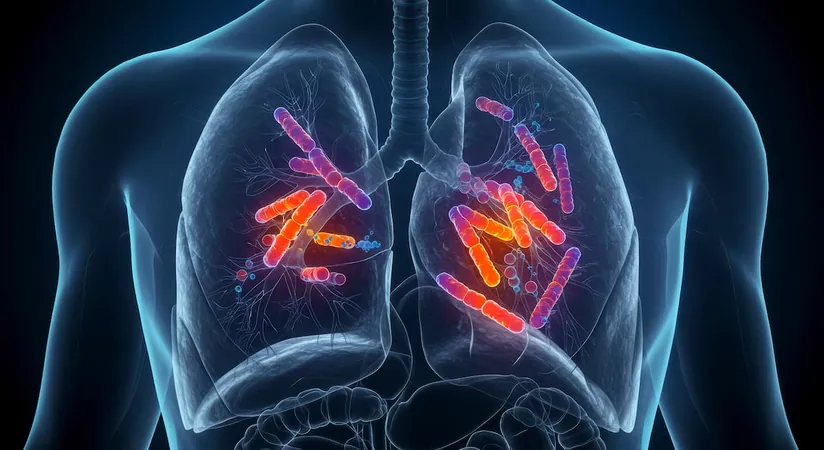
Unlocking the Secrets of Midlife: How a Game-Changing 10-Year Study is Revolutionizing Women's Health
2025-04-13
Author: Wei Ling
A Groundbreaking Initiative for Women's Health
The National University of Singapore (NUS) and National University Hospital (NUH) have embarked on a revolutionary 10-year program designed to tackle the pressing health concerns of midlife women in Singapore. This initiative aims to bridge the gender healthcare gap by focusing on issues often overlooked in traditional medical research.
Why Ethnicity Matters in Health Research
Led by Professor Yong Eu Leong, a prominent figure in women's health research, the Integrated Women’s Health Programme (IWHP) was launched in 2014. With a diverse cohort of 1,201 women aged 45 to 69, this comprehensive study aims to uncover how various health conditions present differently among ethnic groups, highlighting that much of the existing medical literature is skewed toward Western populations.
Unique Health Concerns Facing Midlife Women
This expansive study not only zeroes in on menopause but also addresses issues such as osteoporosis, anxiety, depression, pre-diabetes, and urinary incontinence. Many of these conditions have been inaccurately attributed to aging or other diseases, yet IWHP seeks to reveal their true connections.
Ethnic Differences and Health Implications
Professor Yong stresses the importance of understanding ethnic variations in health, as different genetic backgrounds can lead to various symptoms and health outcomes. For instance, findings suggest that problems faced by Indian women might differ starkly from those experienced by Chinese and Malay women due to genetic and environmental factors.
Tracking Progress Over Time
The first phase of the study recruited participants from 2014 to 2016, and follow-ups are already showing valuable insights into the progression of health conditions over six years. With funding secured for a third follow-up in 2026, the longitudinal approach of IWHP is a pioneering effort in understanding women’s health across Asia.
Misconceptions Around Menopause
While hot flashes are the most recognized symptom of menopause in Western contexts, IWHP found that muscle aches and joint pains—collectively termed arthralgia—are the primary complaints among Singaporean women. This critical insight could change how menopause is viewed and treated within Asian demographics.
Impact of Poor Muscular Strength and Hormonal Factors
An alarming revelation from IWHP is that poor muscle strength and abrupt drops in estrogen levels can lead to significant health declines for menopausal women. A crucial paper from the study revealed that over 20-30% of participants experience pelvic floor issues, like urinary and bowel incontinence.
Proactive Measures for Better Health
Findings suggest that lifestyle changes, including strength training and hormone therapy, can significantly improve the health of midlife women. Professor Yong emphasizes that tailored health programs addressing specific group needs are essential to enhance physical strength and overall well-being.
Bridging Health Gaps: The MUSE-RCT Study
Currently, the IWHP is conducting the MUscle Strengthening exercises and Estrogen replacement therapy Randomised Control Trial (MUSE-RCT), targeting menopausal symptoms like joint pain. The study also addresses the mental health implications of menopause, including anxiety and depression linked to sleep disruptions.
Voices of Participants: A Personal Journey to Better Health
Early participants are already reaping benefits from their involvement. Sum Sui Cheng, 64, reflects on how her participation has enlightened her about cardiovascular health and bone density. Another participant, Wong Lilin, 62, reports increased awareness and has adopted a healthier lifestyle focusing on nutrition and bone health, significantly reducing her reliance on medications.
A Renewed Focus on Women's Health
As IWHP continues its groundbreaking work, the insights gained not only serve to enhance individual health but also contribute significantly to the broader understanding of women’s health globally. This pioneering study is setting a new standard for how midlife women's health is researched and addressed, marking a vital step forward in gender-specific healthcare.



 Brasil (PT)
Brasil (PT)
 Canada (EN)
Canada (EN)
 Chile (ES)
Chile (ES)
 Česko (CS)
Česko (CS)
 대한민국 (KO)
대한민국 (KO)
 España (ES)
España (ES)
 France (FR)
France (FR)
 Hong Kong (EN)
Hong Kong (EN)
 Italia (IT)
Italia (IT)
 日本 (JA)
日本 (JA)
 Magyarország (HU)
Magyarország (HU)
 Norge (NO)
Norge (NO)
 Polska (PL)
Polska (PL)
 Schweiz (DE)
Schweiz (DE)
 Singapore (EN)
Singapore (EN)
 Sverige (SV)
Sverige (SV)
 Suomi (FI)
Suomi (FI)
 Türkiye (TR)
Türkiye (TR)
 الإمارات العربية المتحدة (AR)
الإمارات العربية المتحدة (AR)